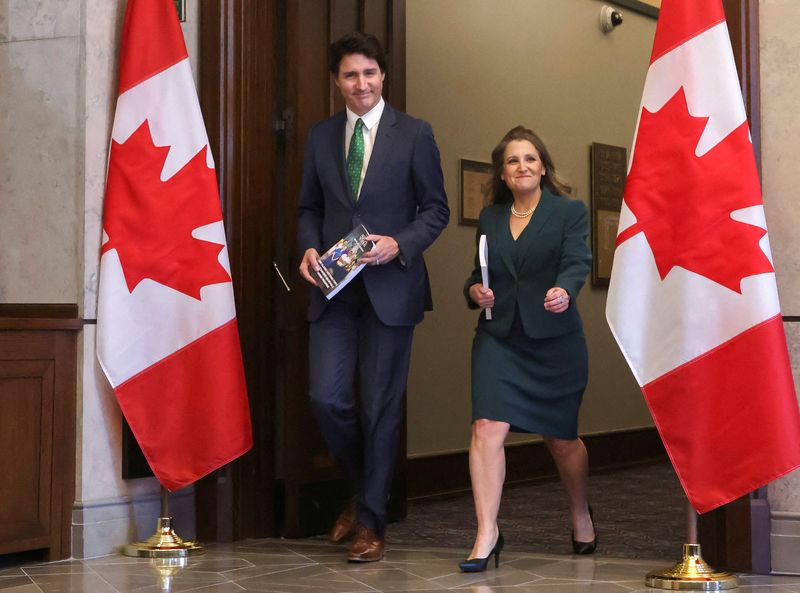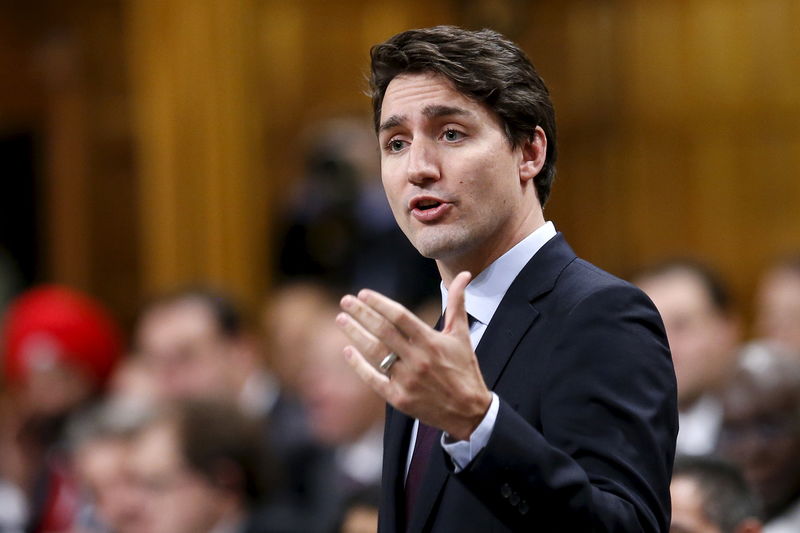By Fergal Smith, Steve Scherer
OTTAWA (Reuters) -As Canada grapples with a possible recession and its highest debt costs in more than two decades, economists say Prime Minister Justin Trudeau should curb his spending habits to ensure that future policy choices are not forced on him.
Trudeau's Liberal government has a reputation for bold spending. In 2015, lagging in the polls, he pledged to run deficits to bolster public infrastructure and won the election. Amid the economic turmoil of the pandemic, his government racked up Canada's highest ever deficit.
However, debt servicing costs are nearing a critical 10% of revenue - a ceiling some economists say is needed in order not to burden future generations or risk cutting government programs. Those debt payments are likely to rise further after bond yields soared globally in recent weeks, they say.
Failing to curb spending now risks "the market dictating to you what you have to do with fiscal policy," said Doug Porter, chief economist at BMO (TSX:BMO) Capital Markets.
"I do think they have to trim the sails a bit," he added.
But it looks like there could be more spending on the way. Finance Minister Chrystia Freeland is expected to unveil measures in the Fall Economic Statement (FES), which could be published as early as next week, including tools to help Canadians' tackle housing and affordability.
The finance ministry, citing the International Monetary Fund, said the country has the lowest deficit and net debt-to-gross domestic product in the G7.
"Canada's economic plan is sound, sustainable, and fiscally responsible," said Katherine Cuplinskas, a spokesperson for the ministry.
Trudeau now faces his lowest poll numbers since taking power, but unlike 2015, deficit spending cannot provide relief for his declining popularity without complicating the Bank of Canada's (BoC's) efforts to quell inflation.
Under current spending plans, the federal and provincial governments already will be adding to inflation next year, BoC Governor Tiff Macklem told reporters last week.
"It's going to be easier to get inflation down if monetary and fiscal policy are rowing in the same direction," Macklem said.
'POLITICAL DYNAMICS'
The Trudeau government says it keeps its fiscal outlook anchored by putting the debt-to-GDP ratio on a downward path in the medium-term. There is scant room for additional expenditure if they want to meet this goal, especially since the economy appears to be in a shallow recession already, analysts say.
Canada's general government net debt, which includes provincial and municipal borrowing but is reduced by pension assets, is the lowest by far among the G7 countries, but its gross debt, at an estimated 106.4% of GDP in 2023, is higher than that of Germany and the UK, IMF data shows.
This year the government has continued to spend on initiatives including subsidies for the electric vehicle supply chain and tax exemptions on new rental apartment construction.
"They're quickly chewing through any fiscal space that they have," Desjardins economist Randall Bartlett said. He had estimated the government could spend about C$13 billion ($9.4 billion) each year and keep the debt-to-GDP ratio from rising, but that was before the summer.
The government has not tallied this additional spending and will outline it in the upcoming FES.
High T-bill issuance in recent months is another possible sign of weaker-than-expected government finances, said Simon Deeley, director of Canada rates strategy at RBC (TSX:RY) Dominion Securities Inc.
If the opposition New Democrats continue supporting his minority government, Trudeau could stay in power for two more years until his term ends.
But that support comes with costly demands, including legislation on a national program to pay for prescription medicines, which would cost C$11.2 billion in the first year alone, the parliamentary budget officer estimates.
"If they proceed with things like pharmacare, or are much more aggressive on housing, credit rating agencies will start asking a lot of questions," said Robert Asselin, senior vice president of policy at the Business Council of Canada and a former finance ministry official.
Fitch Ratings stripped Canada of its triple-A credit rating in June 2020, citing pandemic spending. Moody's (NYSE:MCO) Investors Service, S&P Global (NYSE:SPGI) Ratings and DBRS Morningstar continue to give Canada their highest rating.

"We're monitoring the political dynamics in the country," said Julia Smith, lead analyst for Canada at S&P Global Ratings, adding "there will have to be some decisions made potentially on other policy initiatives" as debt servicing costs rise and growth slows.
($1 = 1.3848 Canadian dollars)
